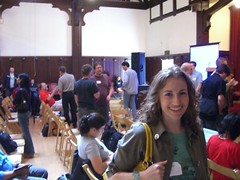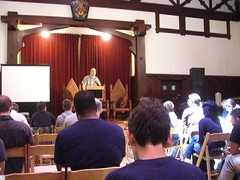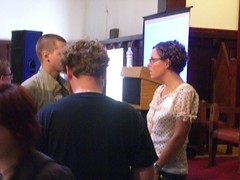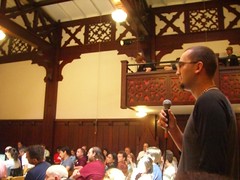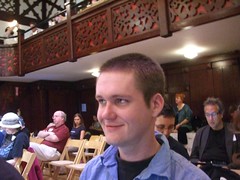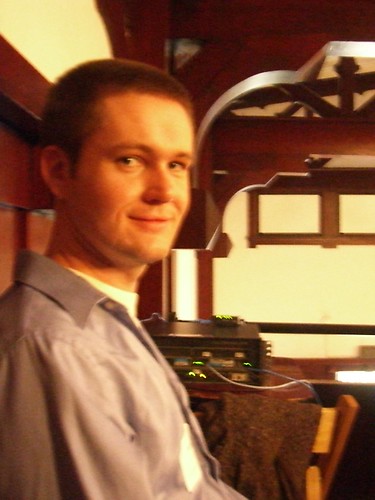Category: technology
Will Spock.com, a social listings service, be worth using?
[Title updated 8/3/2007]
I read about Spock.com on O’Reilly Radar a few months ago, and couldn’t help but be intrigued. Mr. O’Reilly wrote:
‘Michael Arrington wrote the other day about spock, the new people search engine, but I have to say that I don’t think he did it justice. Spock is really cool, and performs a unique function that is well outside the range of capabilities of current search engines. What’s more, it’s got a fabulous interface for harvesting user contribution to improve its results.
You can search for a specific person — but you can do that on Google. More importantly, you can search for a class of person, say politicians, or people associated with a topic — say Ruby on Rails. The spock robot automatically creates tags for any person it finds (and it gathers information on people from Wikipedia, social networking sites like LinkedIn and Facebook), but it also lets users add tags of their own, and vote existing tags up or down to strengthen the associations between people and topics. Users can also identify relationships between people (friend, co-worker, etc.), upload pictures, and provide other types of information. This is definitely a site that will get better as more people use it — one of my key tests for Web 2.0. It also illustrates the heart of a new development paradigm: using programs to populate a database, and people to improve it.’
The service is a closed beta, but I finally found a way to check it out–I left my request for it at InviteShare and moments later, I was invited. [Check that service out if you are wondering what new web2.0 stuff is coming down the pike or want to join Spock or Pownce. In fact, InviteShare itself could actually develop into a pretty cool social networking site–at least until everyone in line gets their invite to the red-hot BitTorrent closed beta sites like SuperTorrents, Demonoid.com and Torrentleech.org.]
So I got my invite and went and looked at the Spock.com site, searched a few tags and a few people, and one thing that struck me is how dependent Spock seems on Myspace profiles–useful enough for lots of people but hardly a reliable main source. Also, some sites are based on LinkedIn profiles and entries about famous people rely heavily on Wikipedia.
I think at the end of the day, if nearly everyone joins and tends to their profile (although I don’t know how much control a user has over their own profile because when I was clicking the link to finish the “claim this profile” process it repeatedly gave an error message) it will basically become a social networking aggregator, a hot field at the moment but different than what the site seems intended for.
Why will it not work as a people listing? Basically, because I don’t know how it won’t become a major spam magnet once it opens up to public users. Besides that, it has all the potential to have all the problems that Wikipedia has with user credibility, self-promotion, grudges and personal attacks.
I went in and added my web site, so now people who look at my entry can find that page alongside my less-recently-updated Myspace page. That’s pretty cool. And since you can tag people, I guess I could have tagged myself “MBA” and “Midwesterner” or stuff like that–maybe I will. But then, what’s to stop someone from going to my profile and tagging me “capitalist pig” and “hillbilly” as well? Nothing, it seems. I guess maybe I can vote those down or something–but for now that’s not enough to convince me it will work, or that in the current social networking blizzard I’d really want to spend much time using this particular site.
It’s all kind of unclear how the site will look with heavy traffic, so my observations are quite preliminary. But does Spock match the hype so far? I don’t think so.
Ok another insignificant search engine changes hands
Here’s a news.com post about the acquisition of the distributed online search engine Grub by Wikia.com:
‘Grub was acquired from LookSmart under the open-source project Wikia. The platform, now available for downloading and testing, is built on users donating their personal computer power. It’s meant to operate through open protocol and community collaborative added functions combined with the wiki.
Last year, Wales claimed that Internet search as we know it is broken. Grub is one of his attempts to gather open-source technologies to organize free content on the Web.’
Well actually I think that Google and Technorati have gotten better rather than worse–and even Live search can be usable. The only thing really broken about search is that people still use Wikipedia and Yahoo and Ask.
I’d say you’re better off letting your computer help the University of California find aliens than trying to help Jimmy Wales beat Google. Anyway the first is more likely to happen.
Wordcamp 2007 – day 2 – photos
WordCamp 2007 – day 2 – Dave Winer
Dave Winer gave a very astute overview of some interesting questions facing WordPress and the overall open source community. Here are my notes from the session:
Dave Winer: “A blog is one person’s voice.”
“Some people say, if it doesn’t have comments it’s not a blog. That’s not true.”
2 forms of blogging
–rss title link description metadata(categories) – each blog post is an essay unto itself
–linkblogging/human aggregation(??)/microblogging (not different from linkblogging??)“I wanted to fit in with the Netvibes/Pageflakes..” wih his RSS feed for his scripting.com blog.
“I love Twitter”
“Future-safe archives”
what about that Feedburner article (note)
open source ID sysem“open source Twitter” — “look at the Twitter API–how can that be replicated?”
“I don’t understand Facebook…I have to accept it that people like it…don’t like that it’s a walled garden”
Wordcamp 2007 – day 1 – the nightcap
WordCamp2007 – day 1 – afternoon session
In the WordCamp Saturday afternoon session Google employee Matt Cutts gave a talk about “white hat” search engine optimization–he covered a lot of stuff but he also said that he wasn’t sure if he could get today’s PowerPoint cleared for release on his blog. So for now, here’s a tip about AdSense that I found interesting–if I copied it down right, here’s the way to emphasize your actual content as opposed to having AdSense scan your whole site:
adsense tags–put the ad-relevant info between these:
<!– google_ad_section_start –>
—
<!– google_ad_section_end –>
Wordcamp 2007 – day 1 – morning session
A series of horrid shrieks emerged from the peanut gallery as the cry went up–“The Internet is down!!” Presenter Dan Kuykendall tried bravely to joke about it–“of course the Internet is going to go down”–but the crowd assembled for WordCamp 2007 at the Swedish-American Hall was slowly giving over to fear and panic. What in the hell happened to the Internet?
Well it appears that some sort of depraved freak from off the street had busted in and wandered upstairs, and with crumbs from a scone snagged downstairs still rolling off his chin tried to rip apart the wiring tangle around the Cisco router in order to harvest its copper. I tried to sound the alarm but in the tussle was pushed into the table, and right after that the connections went down.
So fortunately no copper was stolen by the madman (only a scone or two) and as he turned to leave down the stairs I stuck a WordPress sticker onto the back of his filthy Members Only jacket– so keep an eye out. Internet connection was restored after some time, although it was clear that the staffer talking on the phone about how to fix it was no CCNA because he was still working on it for three minutes after the Internet had returned and only stopped messing with the decrepit old router when told to by an associate.
I’ll write some updates if anything else interesting happens–and if I don’t write anything else then there’s only one logical assumption about that. Also don’t forget to check my photo album from this morning’s WordCamp on Webshots. Here’s a photo that was snapped just before all that craziness with the Internet happened.
Wordcamp 2007
The 2nd annual Wordcamp event is happening in San Francisco this weekend. Jessica and I are planning to attend.
Some are voicing their concerns about WordPress upgradability and security issues over the last year, which is a matter that needs to be addressed.
What I’m interested in is how WordPress will deal with the range of competitive threats in the self-hosted blog/CMS market, all the way from Gelato self-hosted tumbleblogs to an upcoming open source Movable Type version to new versions of smaller competitors like B2Evolution.
Dude, not many people are getting a Dell!
Dell Computer, one of those “success” case studies repeated to me ad nauseum in business school, is seeing a dive in market share after so many years earlier during this decade spent taking share away from competitors in a stagnant market. Now PC sales are up again, but somehow Dell is losing market share to HP and Acer.
Having a “mass customization” system for largely look-alike and work-alike PCs isn’t the magic formula so many believed it was.
But that’s not all. One thing people may not have noticed about that “E” logo that Dell often uses for their brand is that it bears an eerie resemblence to the old Enron symbol.
Now this Texas company is being investigated by the SEC, and it still hasn’t turned in audited 2006 results.
This accounting scandal may largely blow over–or it may reveal enormous financial shenanigans that prove that even Dell’s amazing growth years ago was the product of falsified reports.
Michael Dell was quoted in April as saying that “The Direct Model has been a revolution, but is not a religion.” Maybe it’s not a revolution either but a racket–and about to get busted up.

